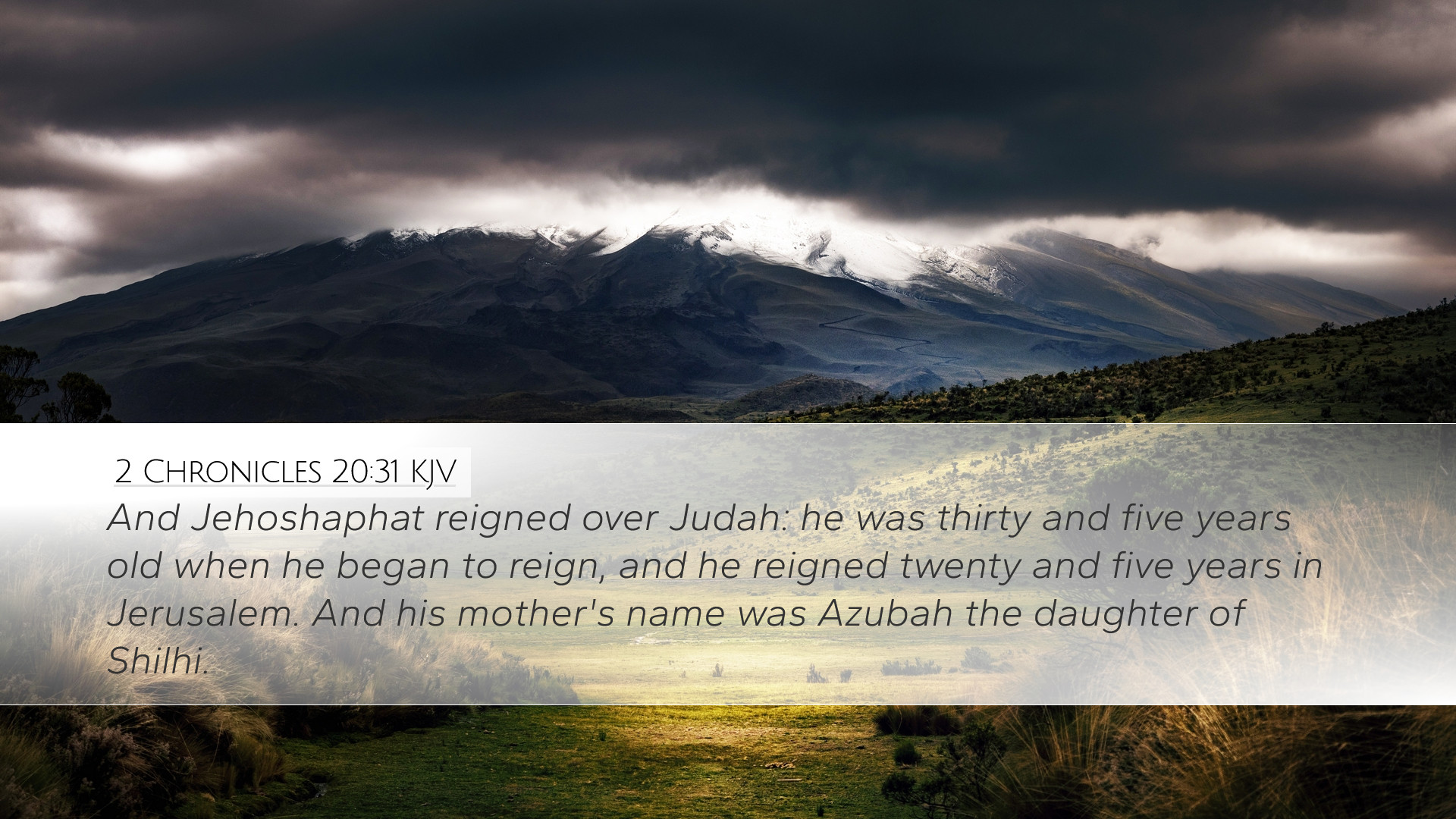Commentary on 2 Chronicles 20:31
Verse: "And Jehoshaphat reigned over Judah; he was thirty and five years old when he began to reign, and he reigned twenty and five years in Jerusalem. And his mother's name was Azubah the daughter of Shilhi."
Introduction
This verse serves as a brief summary of King Jehoshaphat's reign over Judah, providing important contextual information. Understanding this passage involves reflecting on his leadership style, his commitment to God, and the historical circumstances of his rule.
Historical Context
The reign of Jehoshaphat, as noted in this verse, occurred during a turbulent time for the kingdom of Judah. He succeeded his father, Asa, and solidified his position through a series of military and administrative reforms. Historically, Jehoshaphat is remembered for his attempts to restore true worship and his efforts to unite the people under the worship of Yahweh.
Matthew Henry's Commentary
According to Matthew Henry, Jehoshaphat's reign is marked by a commitment to righteousness. Henry notes that Jehoshaphat sought to lead his people back to God, emphasizing the importance of turning away from idolatry and highlighting his attempts at judicial reform and spiritual renewal.
Albert Barnes' Insights
Albert Barnes underscores the significance of leadership within the context of Jehoshaphat's reign. He describes Jehoshaphat as a king who prioritized understanding and following God's laws. His efforts in securing peace and prosperity for Judah through faithful governance are particularly noted, with Barnes appreciating how Jehoshaphat's decisions impacted the nation's stability.
Adam Clarke's Contributions
Adam Clarke adds depth to the discussion by addressing Jehoshaphat's youthful age when he ascended to the throne. Clarke highlights that a ruler's formative experiences, particularly at a young age, can greatly influence their approach to leadership. Jehoshaphat's strong moral compass and reliance on divine guidance are pivotal points raised in Clarke's commentary.
The Importance of Age in Leadership
The reference to Jehoshaphat's age at the beginning of his reign invites reflection on the role of youth in leadership. At 35 years old, Jehoshaphat embodies a blend of vigor and wisdom, suggesting that effective leadership can arise from a commitment to learning and growth throughout one's life.
Matthew Henry's Perspective
Henry observes that age and experience should correlate with the wisdom exercised in leadership. He notes that Jehoshaphat's reign is an encouragement for those in positions of power to seek wisdom and guidance from God as a foundation for their decisions.
Albert Barnes' View on Leadership
Barnes comments on how Jehoshaphat's youthful earnestness played a role in his willingness to pursue godly reforms, suggesting that fervor often found in youth can lead to significant societal changes when tempered by the guiding principles of Scripture.
Jehoshaphat's Reforms and Faithfulness
This verse ultimately serves as a prelude to examining Jehoshaphat’s reforms which are detailed later in Chronicles. He took decisive action to restore the temple, implemented instruction of the law, and called the people together for worship and prayer.
Impact of Reforms on the Nation
- Spiritual Revival: Jehoshaphat initiated reforms that led to a national revival, including a return to the worship of Yahweh after periods of neglect.
- Strengthening the Judiciary: He appointed judges throughout the land, urging them to act with justice and righteousness, thereby strengthening the legal system.
- Military Preparedness: Understanding the political climate, he fortified the defenses of Judah to prepare for potential invasions.
Reflections from Adam Clarke
Clarke emphasizes that Jehoshaphat's reliance on God in times of warfare is a key takeaway from his reign. The famous battle where Judah faced overwhelming odds serves as an example of his faith, demonstrating how spiritual commitment can lead to divine intervention and victory.
Conclusion
2 Chronicles 20:31 encapsulates the essence of Jehoshaphat's reign: a king who began his leadership under God’s guidance. His story continues to resonate with contemporary leaders, urging them to pursue divine wisdom in their decision-making processes. As one contemplates Jehoshaphat's example, there is a clear reminder that a faithful heart aligned with God’s will can lead to national blessings and enduring legacies.


